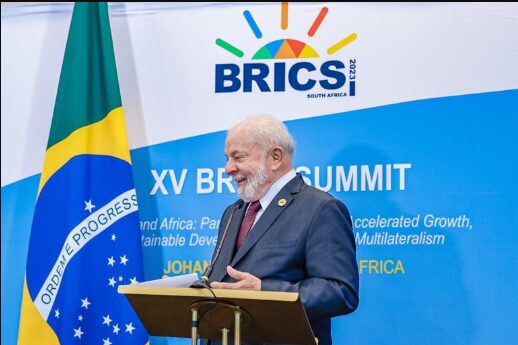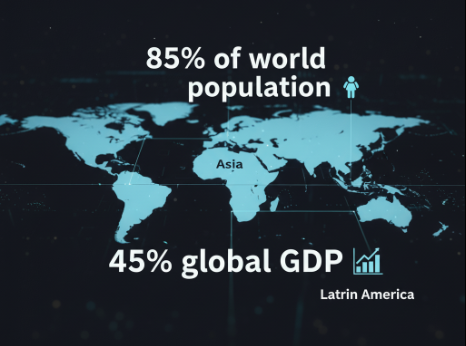The chiefs of Brazil, Russia, India, China, and South Africa, and their new BRICS brothers, joined together under a banner that declared with such defiance: Strengthening Global South Cooperation for More Inclusive and Sustainable Governance. at the humid halls of the Rio de Janeiro summit center on July 6, 2025.
With Brazilian President Lula da Silva appealing to the spirit of the Non-Aligned Movement, African representatives of Ethiopia and South Africa made their demands of UN Security Council reform even louder than their anger at being marginalized in a post-WWII order that has become even more archaic. This was no acting but a manifesto. The Global South, which houses 85% of the world population, is no longer whispering, be it through the push of the African continent to become a permanent UNSC member, the technological ambition of Asia, the G20, or the climate justice call of Latin America.
It is proposing a rewrite of the rules, pitting BRICS like a battering ram against Western dominance. X waves power: “Africa, Speak at 75… One of the posts proclaims A Call for JUSTICE, DIGNITY, and REFORM at the UN, which reflects the crude haste. Their uprising in a multipolar world is not an insurrection; it is vengeance.

Brazil’s president channels the spirit of non-alignment, urging the Global South to rewrite the rules of world governance.(Source: Facebook)
The Awakening: From Margins to Mainstream
The noisiness of the Global South can be traced back to the 1955 Bandung Conference, during which recently independent countries promised to avoid the Cold War binaries. Jump to 2025: The fruit of decolonization—economic growth in the tigers of Asia, a demographic boom in Africa (it will produce 2.5 billion by 2050), and a resource advantage in Latin America—has given rise to muscle-building. BRICS, which used to be an acronym in the banking sector, now includes 10 full-fledged members (that include Egypt, Ethiopia, Iran, UAE, and Saudi Arabia in 2024) and 30+ partners, 45 percent of the world’s GDP. This was solidified by the Kazan Summit in October 2024 and the Rio event in July 2025: Statements denounced unilateral coercive measures (code name sanctions) and demanded more vocal voices at international gatherings.
In September 2025 at UNGA80, African leaders such as Ethiopia’s PM Abiy Ahmed gave a message about this reform: Permanent seats for the continent, dilution of vetoes, and fair IMF quotas. Through the G20 presidency changing hands from Brazil to Asia, India concentrated on such core issues as food security and climate financing. Through the BRICS, spearheaded by Latin America, inequality was integrated into the narrative, and they sought debt relief and equity in trade. It is not disintegration but federation, a kind of creative diplomacy of crisis between Ukraine and Gaza, a vision of Brazil in 2025 as BRICS, as described by CEBRI.
UN Reforms: A Seat at the Table or Bust
The UN, the decrepit 1945 relic, is the zero point. The Global South’s beef? The five permanent powers of the Security Council (P5: US, UK, France, Russia, and China) have vetoes that cripple measures to be taken against their predicaments—imagine the Sudan famine or Haiti anarchy. In UNGA80, the South African foreign minister called on the African message, where two permanent African seats and widening the non-permanent seats were requested and supported by 54 countries. In September, BRICS ministers repeated, “UNSC reform to cause the magnified voice of the Global South.”
The chorus of Asia under the leadership of India and Indonesia insists on P5 expansion, i.e., no veto to new members, but equal representation in the decision-making. The CELAC block of Latin America, through Mexico and Argentina, relates reform to migration and drug wars, whereby the UN’s silence increases inequality. Progress? Slim. As of July 2025, the G4 (India, Japan, Germany, and Brazil) reintroduced plans, but P5 opposition, or tacit support of China with the disguise of a veto threat, blocks votes. X sentiment? Frustrated, “Engaging the BRICS: a view from the Global South” laments the dispute among the bloc itself.

Behind the politics lies the scale of the population, economic weight, and resources fueling the Global South’s new assertiveness. (Source: Kenyan Digest)
G20 and BRICS: Parallel Powerhouses
Get into the G20 and BRICS arenas, where the South does not have the veto shackles. An upcoming stint, Brazilian president G20 presidency in 2025, a BRICS co-partner, highlights Advancing Climate, Equality, and Multilateral Reform, according to the analysis of Stimson Center. The BRICS Declaration by Rio promised a green tech and digital infrastructure development bank with a budget of 100 billion to rebel against the biases at the World Bank. According to Leadership Online, South Africa considers BRICS as a pivot to advocate on the UNSC/IMF, to raise voices on the debt (Africa is burdened with 1 trillion in debt).
This is leaderless by Asia: the 2024 G20 agenda of China balances Global South food/climate requirements, and the Indian 2023 demand to join the African Union was an example. Latin America uses BRICS as an exchange of commodities, with soy from Brazil and lithium from Argentina as bargaining chips. However, according to Carnegie, growth is perilous because of dilution: Newcomers such as Saudi Arabia draw divergent concerns, such as oil handouts and human rights.
Regional Spotlights: Africa’s Urgency, Asia’s Ambition, Latin America’s Resilience
Africa: At 1.4 billion strong, the continent demands UNSC parity— “no representation without taxation,” as one diplomat quipped, nodding to its 3% global GDP share versus veto-less voice. Ethiopia’s UNGA80 plea for “fair, inclusive & future-ready UN” resonated, tying reform to Agenda 2063.
Asia: With 4.7 billion people, it’s the gravitational center. Indonesia and Pakistan rally for P5 spots, while ASEAN’s G20 inputs stress supply chain equity amid U.S.-China tech wars.
Latin America: From Mexico’s migration pleas to Chile’s lithium leverage in BRICS, the region fuses reform with sustainability—Brazil’s Rio Declaration vows “inclusive governance” for debt-saddled nations.
Challenges: Northern Pushback and Internal Fractures
Resistance is fierce. According to Taylor and Francis, the EU needs to review its ties with the Global South after Kazan, though the momentum of inertia would prefer the situation remain the same—France is holding on to a veto like a relic. Domestically, BRICS also cracks: Ideological differences between pragmatic Brazil and aggressive China are used to water down cohesiveness. X threatens collusion and co-existence between Europe and China and the allegiance of the South. Politically incorrect fact: The emergence of the South is a threat to the Northern privileges proved by halted IMF quota increases and vetoed G20 debt relief, threatening a two-tier world order.
The Horizon: A Multipolar Mandate or Stalemate?
As per forecasts, by 2030, BRICS might overtake G7 GDP, thus necessitating reforms or giving birth to parallel institutions. Expansion of the UNSC by 2027, according to optimists, is a Silicon Curtain; divided governance by 2027 is viewed skeptically. The UN80 clarion of Africa, justice, and dignity introduces the note. The rise of China, according to the China-CEE Institute, requires Northern readjustment, or obsolescence, on the part of the South.
The Global South is not emerging but recovering. Since Rio proclaimed it in his statements and in New York from his podium, they demand nothing but Governance for all or none. Their voices are not a choice in a world of flux but rather an inevitability.
| Forum |
Key Global South Demand (2025) |
Regional Lead |
| UNSC |
Permanent seats for Africa/Asia/Latin America; veto limits |
Africa (Ethiopia/South Africa) |
| G20 |
Debt relief, climate finance equity |
Asia (India/China) |
| BRICS |
$100B dev bank for South-led projects |
Latin America (Brazil) |

 General News6 days ago
General News6 days ago
 General News2 days ago
General News2 days ago
 Politics2 days ago
Politics2 days ago
 General News5 hours ago
General News5 hours ago







